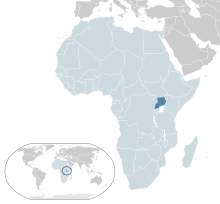LGBTQ rights in Uganda | |
|---|---|
 | |
| Status | Illegal since 1902 (as Protectorate of Uganda)[1] |
| Penalty |
|
| Gender identity | No |
| Military | No |
| Discrimination protections | None |
| Family rights | |
| Recognition of relationships | No recognition of same-sex unions |
| Restrictions | Same-sex marriage constitutionally banned since 2005 |
| Adoption | No |
Lesbian, gay, bisexual, transgender, and queer (LGBTQ) people in Uganda face severe legal and social challenges not experienced by non-LGBTQ residents.[3][4] Same-sex sexual activity is illegal for both men and women in Uganda. It was originally criminalised by British colonial laws introduced when Uganda became a British protectorate, and these laws have been retained since the country gained its independence.[1]
Although largely unenforced for decades, attempts to reinvigorate the application of anti-homosexuality laws has been ongoing since the 1990s. In the decades since, anti-gay rhetoric and efforts to introduce harsher laws have gained momentum, culminating in the Anti-Homosexuality Act, 2023, which prescribes up to twenty years in prison for "promotion of homosexuality", life imprisonment for "homosexual acts", and the death penalty for "aggravated homosexuality".[5] The latter offence includes "serial offenders", same-sex rape, sex in a position of authority or procured by intimidation, sex with persons older than seventy-five, sex with the disabled and mentally ill, and homosexual acts committed by a person with a previous conviction of homosexuality. Further, under its provisions, the promotion (including normalisation) of homosexuality is punishable by imprisonment for up to 20 years and fines.[6] This Act came into force in 2023,[A][2] making Uganda the only Christian-majority country to punish some types of consensual same-sex acts with the death penalty.[7] A similar law had been passed in 2013, but was in 2014 struck down as unconstitutional by the Constitutional Court of Uganda on legal technicalities.[8] Same-sex marriage has been constitutionally banned since 2005.[9] Some foreign governments and international organisations have rescinded funding to Uganda due to its extreme anti-LGBTQ legislation.[10]
LGBTQ people face severe discrimination in Uganda, actively incited by conservative political, religious and community leaders, with the upsurge in such activism since the 1990s encouraged or influenced by foreign anti-LGBTQ campaigners.[11][12][13] Violent attacks and harassment against LGBTQ people are common, often performed by state officials.[14]
Male same-sex sexual activity was present and largely unremarkable in many contexts in precolonial Ugandan society.[15][16][17][18]
- ^ a b Han, Enze (3 May 2018). British Colonialism and the Criminalization of Homosexuality. Routledge. p. 34. ISBN 9781351256186.
- ^ a b Okiror, Samuel (2 May 2023). "Uganda's parliament passes mostly unchanged anti-LGBTQ bill". The Guardian. ISSN 0261-3077. Retrieved 2 May 2023.
- ^ Baska, Maggie (11 November 2023). "'What am I leaving behind?': Queer Ugandans on the run from anti-homosexuality law speak out". PinkNews. Retrieved 11 November 2023.
- ^ "Uganda: Court Upholds Anti-Homosexuality Act". Human Rights Watch. 4 April 2024. Retrieved 10 May 2024.
- ^ Nyanzi, Stella; Karamagi, Andrew (2015). "The social-political dynamics of the anti-homosexuality legislation in Uganda". Agenda: Empowering Women for Gender Equity. 29 (1 [103]): 24–38. doi:10.1080/10130950.2015.1024917. ISSN 1013-0950. JSTOR 43825974. Special issue: 'Non-normative' sexual and gender diversities in Africa.
- ^ https://www.parliament.go.ug/sites/default/files/The%20Anti-Homosexuality%20Act%2C%202023.pdf [bare URL PDF]
- ^ "Uganda anti-homosexuality bill sets death penalty as punishment". The Times. 21 March 2023.
- ^ "Uganda court annuls anti-homosexuality law". BBC News. 1 August 2014.
- ^ Cite error: The named reference
IGLHRCwas invoked but never defined (see the help page). - ^ "Uganda". Human Dignity Trust. Retrieved 4 February 2024.
- ^ Cite error: The named reference
pink icuwas invoked but never defined (see the help page). - ^ Cite error: The named reference
pink2014 live fearwas invoked but never defined (see the help page). - ^ Fitzsimons, Tim (19 October 2019). "Amid 'Kill the Gays' bill uproar, Ugandan LGBTQ activist is killed". NBC News. Retrieved 17 January 2020.
- ^ Jjuuko, Adrian, ed. (May 2020). Consolidated Violations Against Key Populations 2019 – Uganda. Human Rights Awareness and Promotion Forum (Report). Kampala, Uganda: The Global Fund; HRAPF. p. 51.
- ^ Rao (2020), pp. 1–32.
- ^ "Ugandan Documentary on Gay Love in Pre-colonial Africa". ILGA. 8 June 2012. Archived from the original on 27 March 2019.
- ^ Hamilton, Kenneth Lewis (December 2009). "The Flames of Namugongo: Issues Around Theological Narrativity, Heteronormativity, Globalization, and AIDS in AfricaNarrativity, Heteronormativity, Globalization, and AIDS in Africa". Journal of the Black Catholic Theological Symposium. 3 (1). Article 6, pp. 63–100.
- ^ Evaristo, Bernardine (8 March 2014). "The idea that African homosexuality was a colonial import is a myth". [Opinion-editorial]. The Guardian.
Cite error: There are <ref group=upper-alpha> tags or {{efn-ua}} templates on this page, but the references will not show without a {{reflist|group=upper-alpha}} template or {{notelist-ua}} template (see the help page).